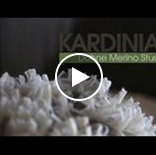Finishing ability proves a winner in Tassie
June 14, 2016 – by Kim Woods Outcross Media
The weight gain and finishing ability of the Dohne has turned a Tasmanian wool and first cross lamb enterprise on its head.
Askin and Cate Morrison ran a traditional fine wool enterprise in the Midlands but consistently had trouble finishing lambs to a saleable 13-18kg dressed weight before the harsh winters set in.
A Dohne infusion in 2014 has resulted in increased weight gains without a loss in wool production, a quicker turn-off period and less young stock to carry through winter.
The couple previously ran a Merino flock, lambing 7000 ewes to Merino rams and 4000 to terminal sires for first cross lamb production.
Adult ewes averaged 21-22 micron, cutting 4.5kg, while the hogget ewes averaged 16-17 micron and 3.3kg.
Set in a 500mm rainfall zone, their 8000ha property, St Peters Pass, at Oatlands ranges in altitude from 300 to 750m, and also supports a 200 cow beef herd and opportunity poppy crops.
Mrs Morrison said the long, harsh winters often proved difficult for weaner lambs.
“We lamb late in October due to the climate but it meant our Merino hoggets were not of a saleable weight in their first winter,’’ she said.
The crossbred lambs were sold as either as stores to finishers or to Tasmanian Quality Meats for their 13-18kg dressed Middle Eastern market.
However, the Merino lambs were unable to meet the over-the-hook specifications in the same time frame.
Two years ago, the development of the Midlands Irrigation Scheme enabled the family to sow irrigated pastures on the lower country for finishing first-cross lambs.
“We needed to address the difficulty of getting young sheep through the winter so we looked for another sheep breed to help us access markets with our wether portion,’’ Mrs Morrison said.
After speaking with other breeders and an agricultural consultant, the couple introduced the first Dohne rams in 2014.
“We weren’t giving up too much wool production and getting a lot better growth rate out of our sheep,’’ Mrs Morrison said.
The first drop of 860 F1 Dohne wether lambs were sold in May 2015, with 2500 to be sold this year and an estimated 3700 next year.
The 2014 drop F1 Dohne wether lambs were compared with the 2014 drop Merino wether hoggets sold last year.
All lambs were born in October, weaned in January onto a mix of phalaris, cocksfoot and clover pasture.
They were weighed on April 8, with the F1 Dohnes averaging 25.4kg liveweight (24 hours off feed and April shorn) and the Merinos 22.9kg (2 hours off feed and unshorn).
All lambs were turned onto a forage turnip crop, with the F1 Dohnes weighing an average of 32.9kg liveweight a month later for an average daily gain of 200 grams.
They were then finished on a ryegrass pasture.
“We were expecting the first truckload of F1 Dohne lambs to go to Tasmanian Quality Meats in May but they were heavier than anticipated on the grid at over 18kg dressed,’’ Mrs Morrison said.
“All Dohne lambs were gone by June 26 to dress at 16.7kg and average $36 a head more than the Merino hoggets, which were sold the following November.’’
Mrs Morrison said processor feedback was positive on the Dohne’s market suitability and ability to meet grid specifications.
The F1 Dohne lambs cut 1.6kg of 18.1 micron wool in April, compared to the October shorn Merino hoggets at 3.1kg and 16.5 micron.
“The Dohnes have done what we wanted them to do, and that is to allow us to turn off a large proportion of our wether hoggets before mid winter, so we are only carrying half of our young stock through,’’ Mrs Morrison said.
“This will make a huge difference to our business.
“The young Dohne ewes have done it tougher, coped better and were fed less pellets than the young Merino ewes at the same time.
“We have no intention of changing – the Dohnes will be good mothers for our first-cross enterprise as well.’’
Dohnes have also been successful for Tasmanian sheep producers Richard and Sarah Johnston, Esk Farm, Longford.
The couple won the Campbell Town show’s Paddock to Plate competition twice in a row with second cross Dohne lambs.
They introduced Dohnes after searching for a dual-purpose sheep they could sell at 12 months of age.
“We didn’t want to get away from the wool, and Dohnes gave us the mix to sell both lambs and wool,’’ Mrs Johnston said.
The Dohne-cross lambs are finished on a mix of annual, perennial and lucerne pastures.
John Tuskin (TP Jones) Peter Blackwood (TP Jones) Nina William (presenting her late husband Peter Williams trophy) Richard Johnston (Esk Farm, Longford) David Taylor (Campbell Town Show Vice President)











